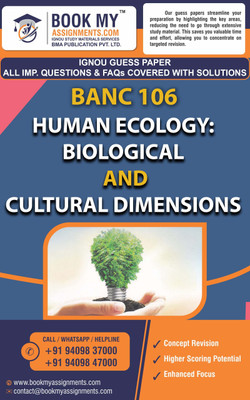IGNOU BANC 106 Human Ecology: Biological and Cultural Dimensions | Guess Paper | Important Question Answer |Bachelor of Science (Honours) Anthropology (BSCANH)(Paperback, BMA Publication)
Quick Overview
Product Price Comparison
Introduction to Human Ecology: Provides an overview of human ecology as an interdisciplinary field that integrates knowledge from anthropology, biology, ecology, geography, sociology, and other disciplines. Introduces key concepts, theories, and methodologies used in the study of human-environment interactions.Biological Foundations: Explores the biological dimensions of human ecology, including physiological adaptations to environmental conditions, genetic diversity, and human impacts on ecosystems. Discusses how biological factors influence human behavior, health, and well-being in different environmental contexts.Cultural Ecology: Examines the cultural dimensions of human ecology, including cultural beliefs, values, practices, and institutions related to the environment. Discusses how cultural systems shape human perceptions of nature, resource use, land tenure, and environmental management.Ecosystem Dynamics: Analyzes ecosystem dynamics and ecological processes, including energy flow, nutrient cycling, biodiversity, and ecosystem services. Discusses human impacts on ecosystems, such as deforestation, pollution, habitat destruction, and climate change.Adaptation and Resilience: Explores strategies of human adaptation and resilience in diverse ecological settings, including traditional ecological knowledge, indigenous resource management practices, and community-based conservation initiatives. Discusses the importance of local knowledge systems and community participation in sustainable resource management.Population and Environment: Examines the relationships between population dynamics, resource consumption, and environmental change. Discusses demographic trends, population growth, urbanization, and their implications for environmental sustainability and social resilience.Land Use and Land Cover Change: Analyzes patterns of land use and land cover change, including deforestation, agriculture, urban expansion, and industrialization. Discusses the drivers of land use change, ecological consequences, and strategies for land management and conservation.Water Resources Management: Explores issues related to water resources management, including water scarcity, water pollution, watershed management, and conflicts over water access and allocation. Discusses sustainable water management practices and policies.

